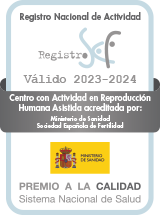Abdominal pain during pregnancy: should we be concerned?
Pregnancy can be described as a physiological condition that affects women in every aspect, both physically and mentally, leading to functional changes that occur in response to this new condition. Abdominal pain during pregnancy can be one of the symptoms associated with these changes.
Índice de contenidos
These are minor and progressive alterations that last throughout the entire 9 months of gestation and often even a few weeks after childbirth. The main purpose is to prepare the mother’s body to welcome the baby and ensure its proper growth.
In particular, a woman might experience sensations linked to pregnancy that can also be alarming, which is why it is important to know them well and, when necessary, consult with a doctor.
One of the most characteristic and common symptoms is abdominal pain. In general, these pains are completely normal and perfectly aligned with pregnancy because they arise from the pressure the growing fetus exerts on the uterine walls and thus on the surrounding organs.
However, if the abdominal pain takes on particular characteristics, such as being accompanied by other symptoms, it’s essential to investigate further. For instance, if it is associated with bleeding, one might consider a possible ectopic pregnancy or miscarriage. Additionally, another distinguishing factor is the timeframe and the stage of pregnancy. Depending on the gestational age, the abdominal pain can have different characteristics and be linked to various medical conditions.
Generally, we talk about abdominal pain in early pregnancy, abdominal pain in the second trimester, or in the third trimester of pregnancy.
Abdominal pain during pregnancy in the first trimester
In the early stages of pregnancy, and throughout the first trimester, it is entirely normal and physiological to experience abdominal pain. These are mostly due to the fetus attaching itself to the woman’s uterus and all the changes that come with it. In particular, discomfort in the lower abdomen can often be mistaken for typical premenstrual pains.
Most of the time, the causes are related to the increased vascularization that accompanies conception. If the abdominal pain continues throughout the first phase of pregnancy, there could be other causes at play. For example, it may be due to constipation secondary to slowed digestion or bloating caused by hormonal shifts leading to uterine dilation.
However, within the first trimester, there can also be causes of abdominal pain that aren’t entirely “benign” and require medical attention.
If the pain becomes persistent, intense, and is accompanied by bleeding, it might be indicative of a threatened miscarriage. In most cases, spontaneous abortion occurs in the first 13 weeks of gestation and can be due to a wide range of causes:
- Genetic problems with the fetus;
- Polycystic ovary syndrome;
- Uterine or cervical disorders;
- Faulty implantation of the embryo.
Not all bleeding associated with pain necessarily leads to a tragic outcome; it simply indicates a very delicate condition that must be appropriately managed by a gynecologist.
Abdominal pain during pregnancy in the second trimester
Abdominal pain may also occur in more advanced stages of pregnancy.
Between the 14th and 23rd week, it can be due to the abdomen’s increased volume and associated muscle stretch. This is again a physiological process that comes with pregnancy, as well as if caused by constipation or back pain.
An additional source of pain, not present in the first trimester, comes from the round ligament of the uterus: a fibro-muscular cord responsible for anchoring the uterus, holding it in its correct position, and preventing pregnancy-induced deformations of the uterine walls. Its stretching can be responsible for the abdominal pain felt by the woman. A remedy might be to change position periodically to reduce excessive tension on the ligament and avoid abrupt movements.
Lastly, another cause of abdominal pain in the second trimester is the Braxton-Hicks contractions, also known as “false contractions.” These are preparatory contractions for labor that can start appearing in this stage of gestation, often secondary to intense physical exertions or due to the baby’s movements. They usually also come with a hardening of the abdomen, but unlike classic labor contractions, they are not frequent and lack regularity.
It is still a transient pain that can be relieved by changing position or rehydration, but it still requires proper medical attention to rule out more severe causes.
Abdominal pain during pregnancy in the third trimester:
In this final phase of pregnancy, a significant pregnancy complication can cause abdominal pain in a small percentage of cases (around 3-5%); this is preeclampsia.
It’s typically diagnosed around the 34th week and affects healthy women in their first pregnancy, manifesting with an increase in blood pressure and proteins released in the urine, in addition to the already mentioned abdominal pain.
The treatment involves childbirth and requires continuous and careful monitoring to prevent potential harm to the mother and fetus.
Abdominal pain after medically assisted procreation (MAP):
Abdominal pain is undoubtedly one of the symptoms that almost always accompany pregnancy, and this includes those achieved through medically assisted procreation.
In fact, an increasing number of couples are experiencing infertility issues, leading to the widespread use of MAP. Pregnancy achieved through these techniques is entirely comparable to that which occurs naturally; therefore, the causes of abdominal pain in these women are completely overlapped with those of a natural pregnancy.















